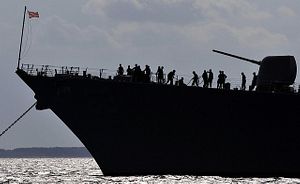On Friday, during a bilateral meeting with Australian Prime Minister Malcolm Turnbull in Washington, D.C., U.S. President Donald J. Trump expressed openness to a joint U.S.-Australia freedom of navigation operations in the South China Sea.
When asked about the prospect of the Royal Australian Navy joining U.S. Navy vessels in these operations, which the United States has been conducting roughly once every six weeks to two months since May 2017, Trump was positive.
“We would love to have Australia involved and I think Australia wants us to stay involved,” he said. Turnbull, for his part, made a remark supporting freedom of navigation, but neither confirmed that Australia would be willing to participate nor ruled it out.
“Australia, as you know, defends the right of freedom of navigation and overflight throughout the world but we do not want to speculate on operational matters,” he said. Turnbull’s remarks echoed remarks last year by Australian Foreign Minister Julie Bishop, who also supported freedom of navigation without committing Australia to participating.
Bishop hinted that U.S. vessels could use the northern Australian port of Darwin, where U.S. Marines are deployed, as a base from which to launch freedom of navigation operations in the South China Sea.
A statement released by the White House after Trump’s meeting with Turnbull emphasized that both leaders “expressed serious concerns about the situation in the South China Sea.”
According to the statement, they “called upon parties to exercise restraint and resolve disputes peacefully based on international law.”
Trump additionally “thanked the Prime Minister for Australia’s continued support for the United States program of Freedom of Navigation Operations.”
While celebrating the U.S.-Australian alliance, the White House statement emphasized bilateral cooperation on promoting a “free and open Indo-Pacific” — an important component of the Trump administration and Turnbull government’s foreign policies. (The Trump administration made Indo-Pacific partnerships a priority in its recent National Security Strategy.)
Both leaders resolved to continue exploring trilateral cooperation with Japan and “affirmed the importance of expanding cooperation between Australia, the United States, Japan, and India.” The leaders did not overtly reference the “quadrilateral” arrangement, but the Indo-Pacific concept was an important component of their talks.
China is sharply critical of U.S. freedom of navigation operations and has warned non-regional countries, including Japan and Australia, to refrain from participating in similar exercises.
The U.S. Navy conducts freedom of navigation operations all over the world and the operations do not target China’s sovereignty over features in the South China Sea. Instead, the freedom of navigation program focuses on protesting excessive maritime entitlement claims.

































